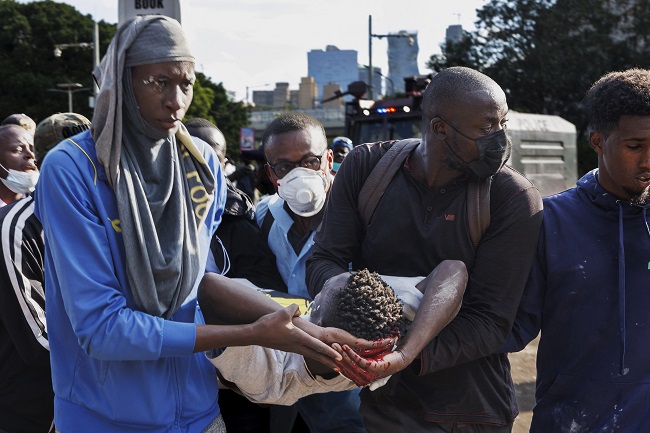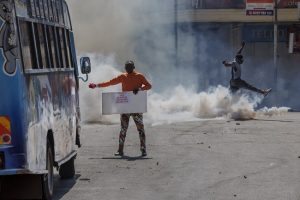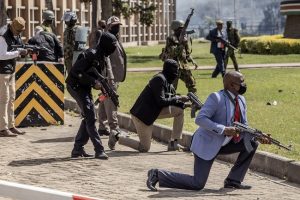
ANTI-TAX HIKE: KENYA PROTEST DEATH TOLL RISES TO 13
According to a representative of Kenya’s primary doctors’ union, the number of people killed in protests has increased to 13, following the violent turn of anti-tax hike rallies and the firing of police by protesters who had stormed parliament.
Kenyans were stunned by the historic images on Tuesday that left portions of parliament on fire and left hundreds of people injured. President William Ruto’s administration responded by deploying the military.
Thousands of protesters marched against the tax rises last week in Nairobi, the nation’s capital, and other locations around the nation as part of the largely peaceful start to the youth-led demonstrations.
CHOLERA OUTBREAK: HOUSING, TRANSPORT, ECONOMIC CHALLENGES MUST BE ADDRESSED – MINISTER OF HEALTH
However, emotions erupted dramatically on Tuesday afternoon when protesters stormed the parliament building and police opened fire.
Hours later, Defence Minister Aden Bare Duale announced that the government had deployed the army to support the police in tackling “the security emergency” in the country.
“So far, we have at least 13 people killed, but this is not the final number,” Simon Kigondu, president of the Kenya Medical Association said, adding that he had never seen “such level of violence against unarmed people.”
“Deaths, mayhem”, read the front-page headline on the Standard newspaper, while the Daily Nation described the situation as “Pandemonium”, saying: “The foundations of the country have been shaken to the core.”
An official at Kenyatta National Hospital in Nairobi said Wednesday that medics were treating “160 people… some of them with soft tissue injuries, some of them with bullet wounds”.
In a late-night press briefing, Ruto warned that his government would take a tough line against “violence and anarchy”, likening some of the demonstrators to “criminals”.
“It is not in order or even conceivable that criminals pretending to be peaceful protesters can reign terror against the people, their elected representatives and the institutions established under our constitution and expect to go scot-free,” he said.
The level of opposition to the government’s proposed taxes, which was spearheaded by young Kenyans belonging to Generation Z, caught them off guard and resulted in events at parliament that were shown live on television.
Pictures of the building that were posted on local TV stations following the rioters’ breach of the barricades indicated it had been looted, with windows smashed and furnishings burned.
Protest organizers advised people to “stay safe” and go home in unison as police opened fire on the enraged throng, scattering multiple bodies on the ground.
A heavy police presence was deployed around parliament early on Wednesday, according to an AFP reporter, the smell of tear gas still in the air.
A policeman standing in front of the broken barricades to the complex told AFP he had watched the scenes unfold on TV.
“It was madness, we hope it will be calm today,” he said.
Earlier on Tuesday, the rallies in various Kenyan cities had been largely peaceful.
However, tensions escalated in Nairobi later in the day, with some protesters hurling stones at police, who deployed tear gas and water cannon before firing live bullets.
AFP journalists saw three people bleeding heavily and lying motionless on the ground near parliament.
The unrest has alarmed the international community, with the White House appealing for calm and more than 10 Western nations — including Canada, Germany and Britain — saying they were “especially shocked by the scenes witnessed outside the Kenyan Parliament”.
UN chief Antonio Guterres and the head of the African Union commission, Moussa Faki Mahamat, have also expressed deep concern.
Veteran opposition leader Raila Odinga, who heads the Azimio coalition, accused the government of unleashing “brute force on our country’s children”.
Rights watchdogs have also accused the authorities of abducting protesters.
The police have not responded to any AFP requests for comment.
Long-running grievances over the rising cost of living spiralled last week as lawmakers began debating proposed tax hikes in the 2024 finance bill.
The cash-strapped government says the increases are needed to service the country’s massive debt of some 10 trillion shillings ($78 billion), equal to roughly 70 percent of Kenya’s GDP.

After rolling back some of the more controversial proposals — which would have affected bread purchases, car ownership, and financial and mobile services — the government now intends to increase fuel prices and export duties.
Kenya’s treasury has warned of a gaping budget shortfall of 200 billion shillings, following Ruto’s decision to roll back some of the tax hikes.
While Kenya is among East Africa’s most dynamic economies, a third of its 52 million population live in poverty.
